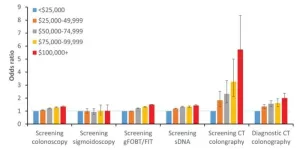(Press-News.org) By Kimberly Flynn
PISCATAWAY, NJ — Despite the harm that excessive alcohol consumption can cause in a community, use of some alcohol-related enforcement strategies remained low or decreased from 2010 to 2019, according to a new report in the Journal of Studies on Alcohol and Drugs. In particular, researchers found a drop in enforcement of underage drinking laws.
Researchers at the University of Minnesota first surveyed 1,028 county and municipal law enforcement agencies throughout the United States in 2010 about their practices regarding three factors to alcohol harms in communities: underage drinking, impaired driving and sales to obviously intoxicated persons.
That study was one of the first to investigate alcohol-related law enforcement efforts on a national level, says lead author Kathleen Lenk, M.P.H., Senior Research Fellow at the University of Minnesota School of Public Health. In the current study, surveying the same agencies (with 742 responding) again in 2019 allowed researchers to assess any changes in alcohol enforcement practices over time. Researchers asked one person from each department whether that agency utilized various enforcement strategies in the last year.
Overall, the researchers found some changes in alcohol enforcement. A concerning -- and surprising -- find was decreasing enforcement of underage drinking laws, says Lenk. The percentage of agencies that reported using compliance checks (law enforcement supervises undercover youth who attempt to purchase alcohol, penalties to the retailer if a sale is made) dropped from 41.9% to 36.4%, enforcing adult provision of alcohol to underage persons decreased from 48.5% to 33.9% and enforcing underage possession/consumption dropped from 84.7% to 66.5%.
“Use of all three types of underage drinking enforcement efforts that we examined significantly decreased from 2010 to 2019 even after accounting for community and agency basic characteristics,” says Lenk. “In addition, enforcement aimed at underage drinkers themselves, versus the alcohol outlets and adults who supply alcohol, were the most commonly used at both time points. This is a common enforcement approach, but studies demonstrate it is more effective to focus on reducing access to alcohol rather than punishing underage persons.”
The use of sobriety checkpoints (43.7% in 2010 and 42.1% in 2019) and the enforcement of laws prohibiting overservice (the sale of alcohol to obviously intoxicated persons; 24.8% and 23.8%) remained consistently low. There were increases in two types of impaired driving enforcement: the percentage of agencies using saturation patrols rose from 69.1% to 75.5%, and open container enforcement increased from 45.6% of agencies to 57.9%.
Questions about priorities of alcohol enforcement (relative to other issues) revealed somewhat conflicting information. Although agencies reported that impaired driving, overservice and underage drinking were less common in their jurisdictions in 2019 compared with 2010, a greater percentage of agencies placed a high priority on impaired driving and overservice enforcement in 2019 than in 2010.
The survey also found that most agencies in both years collaborated with local media for their impaired driving enforcement efforts, which has been shown to help make sobriety checkpoints and saturation patrols more of a deterrent.
The researchers point out the limitations of their study, including that data were self-reported by the agencies and that agencies that participated in both years of the survey were likely to have smaller populations and a lower percentage of Black and Hispanic residents compared with agencies that did not participate in both surveys. However, they say their findings still suggest that agencies could adopt more alcohol enforcement strategies, including in the three areas studied here.
“Our results indicate the need for improvement in alcohol enforcement regarding underage drinking, impaired driving, and sales to obviously intoxicated persons,” says Lenk. “Improvement is warranted particularly in focusing on suppliers of alcohol to youth rather than underage drinkers and increased awareness and enforcement of selling alcohol to obviously intoxicated patrons.”
-----
Lenk, K. M., Scholz, N., Erickson, D. J., Joshi, S., Toomey, T. L., Jones-Webb, R., & Nelson, T. F. (2023). Alcohol enforcement in the United States from 2010 to 2019. Journal of Studies on Alcohol and Drugs, 84, 416-423. doi:10.15288/jsad.22-00096
-----
To arrange an interview with Dr. Toben Nelson (study principal investigator), please contact Sarah Bjorkman at 612-624-6708 or bjor0180@umn.edu.
-----
The Journal of Studies on Alcohol and Drugs is published by the Center of Alcohol & Substance Use Studies at Rutgers, The State University of New Jersey. It is the oldest substance-related journal published in the United States.
-----
The Journal of Studies on Alcohol and Drugs considers this press release to be in the public domain. Editors may publish this press release in print or electronic form without legal restriction. Please include a byline and citation.
-----
To view the public domain, stock-photo database of alcohol, tobacco and other drug-related images compiled by the Journal of Studies on Alcohol and Drugs, please visit www.jsad.com/photos.
END
Use of law enforcement strategies to curb underage drinking has decreased over past decade: Study
2023-07-20
ELSE PRESS RELEASES FROM THIS DATE:
The malnutrition paradox: Adolescent obesity in Zimbabwe
2023-07-20
In some African countries that have traditionally faced issues such as undernourishment and hunger, being overweight is perceived as a good sign of health and prosperity. However, in most of these countries, a malnutrition paradox is evident. Obesity, a chronic disease that affects millions of people worldwide, is increasing at an alarming rate in countries like Zimbabwe, where the consumption of processed, energy-dense foods associated with western lifestyles, has been adopted.
An insightful study led by graduate student Ashleigh Pencil, from the Graduate School of Human Life ...
Dreaming in technicolor
2023-07-20
A team of computer scientists and designers based out of the University of Waterloo have developed a tool to help people use colour better in graphic design.
The tool, De-Stijl, uses powerful machine learning technology to suggest intuitive colour palettes for novice designers and inexperienced users. The software combines and improves on the functionalities of existing tools like Figma, Pixlr, and Coolor, allowing users to select important theme colors and quickly visualize how they’ll impact a design.
“You put your graphical ...
NIH renews UC Davis MIND Institute grant to study fragile X-associated syndromes for 24th year
2023-07-20
It’s been 22 years since UC Davis MIND Institute Medical Director Randi Hagerman and her husband, researcher Paul Hagerman, discovered the neurodegenerative condition called FXTAS (fragile X-associated tremor ataxia syndrome). Hagerman, a pediatrician known for her enthusiasm for her work and patients, has been studying FXTAS ever since, seeking to develop treatments for it.
She was recently awarded her 24th consecutive year of funding from the National Institutes of Health for her fragile X-related work, a ...
AI must not worsen health inequalities for ethnic minority populations
2023-07-20
Scientists are urging caution before artificial intelligence (AI) models such as ChatGPT are used in healthcare for ethnic minority populations. Writing in the Journal of the Royal Society of Medicine, epidemiologists at the University of Leicester and University of Cambridge say that existing inequalities for ethnic minorities may become more entrenched due to systemic biases in the data used by healthcare AI tools.
AI models need to be ‘trained’ using data scraped from different sources such as healthcare websites and scientific research. However, evidence shows ...
Monitoring T cells may allow prevention of type 1 diabetes
2023-07-20
LA JOLLA, CA—Scripps Research scientists have shown that analyzing a certain type of immune cell in the blood can help identify people at risk of developing type 1 diabetes, a life-threatening autoimmune disease. The new approach, if validated in further studies, could be used to select suitable patients for treatment that stops the autoimmune process—making type 1 diabetes a preventable condition.
In the study, which appeared in Science Translational Medicine on July 5, 2023, the researchers ...
Important groups of phytoplankton tolerate some strategies to remove CO2 from the ocean
2023-07-20
Humanity has a long track record of making big changes with little forethought. From fossil fuels to AI, plastics to pesticides, we love innovating away our problems, only to find we’ve created different ones. So it can be refreshing to hear about cases where we’ve taken a step back to deliberate before committing to a drastic new idea, like carbon dioxide removal.
With carbon emissions continuing to climb, many scientists, environmentalists and policy-makers have advocated taking action to directly ...
Private equity takeovers of healthcare services linked to patient harm
2023-07-20
Private equity ownership of healthcare services such as nursing homes and hospitals is associated with harmful impacts on costs and quality of care, suggests a review of the latest evidence published by The BMJ today.
No consistently beneficial impacts of private equity ownership were identified, and the researchers say these results confirm the need for more research on private equity ownership in healthcare and possibly increased regulation.
Private equity firms use capital from wealthy individuals and large institutional investors to buy companies, and, after a relatively brief period of ownership, ...
Disrupted access to healthcare during pandemic linked to avoidable hospital admissions
2023-07-20
People who experienced disrupted access to healthcare (including appointments and procedures) during the covid-19 pandemic were more likely to have potentially preventable hospital admissions, finds a study published by The BMJ today.
This is the first study to examine the impact of disruption on health outcomes using individual level longitudinal data, and the researchers say reducing the backlog from covid-19 disruption is vital to tackle the short and long term implications of the pandemic.
The ...
Exposure to antiseizure medications does not harm neurological development in young children
2023-07-20
PITTSBURGH, July 19, 2023 — Most mothers who took prescription antiseizure medications during pregnancy can breathe a sigh of relief: A new study published today in Lancet Neurology found that young children who were exposed to commonly-prescribed medications in utero do not have worse neurodevelopmental outcomes than children of healthy women.
Commonly used antiseizure medications such as lamotrigine and levetiracetam are generally considered effective and safe, especially compared to many first-generation epilepsy treatments that carried profound risks to the unborn child. ...
AJR on sociodemographic factors and screening CTC among Medicare beneficiaries
2023-07-20
Leesburg, VA, July 19, 2023—According to an accepted manuscript published in the American Journal of Roentgenology (AJR), lacking Medicare coverage could contribute to greater income-based differences in use of screening CT colonography (CTC) than of other recommended screening strategies or of diagnostic CTC.
Noting that Medicare’s non-coverage for screening CTC may account for lower adherence with screening guidelines among lower-income beneficiaries, “Medicare coverage of CTC could reduce income-based disparities for individuals avoiding optical colonoscopy due to invasiveness, need for anesthesia, or complication ...



